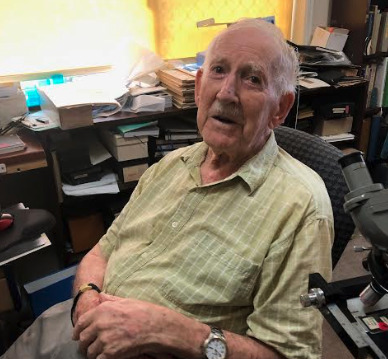Baycrest Retirement Village resident, Dr Vernon Harris, 97, has been recognised for discovering more than 40 new species of copepod, a microscopic marine creature.
Starting his career as a Zoologist in London after WWII, Vernon’s ongoing work – including
continued contributions with the University of the Sunshine Coast – was recognised with the
Fraser Coast STEM Award.
“The animals I study are beautiful colours and they can be found on seaweed but they are less than one millimetre in size, like a little dot,” Vernon said.
“You have to use a microscope to see them, and I had to find a way to get them off the
seaweed, because they would hang on so tightly.
“I have found about 30 species in Australia, more than ten in Japan and some in Scotland –
there are only 71 species that have been described,” he said.

Vernon’s work has taken him around the world.
“Life is a funny thing – my life has taken me on two quite distinct pathways and neither of them I had ever planned or anticipated, they were sheer incidents that completely changed my life.
“After the war I completed my degree in Zoology and Animal Physiology and worked under
Professor Gip Wells, a famous Zoologist and son of H.G. Wells, before being scouted by the
university London University was opening in Nigeria.
“During my time there as a lecturer for nine years – and this was when one of those funny
things happened that changed my life – I met my wife.”

Vernon would become a highly sought-after Zoologist after crafting a completely new syllabus during his time in Nigeria with the London University.
“I was then contacted by a professor from Australian National University in Canberra to come out and plan a new syllabus.
“Deciding to stay in Australia was the second thing that changed our lives, because we
realised we didn’t want to go back to London.
“One Christmas, my wife and I decided to go up to the Snowy Mountains and this was when we decided to buy a 14,000 acre block of land out there and got our Australian Citizenships.”
These days Vernon resides at Bolton Clarke’s Baycrest retirement village, where he continues his studies from his unit as one of the world’s pre-eminent copepod experts.
“I’m still working on them and I’m writing my book about them – it’s not often that people write a book on something nobody knows about.”
Hear more about Vernon’s work here: https://youtu.be/ShkjHpeoL6g.


